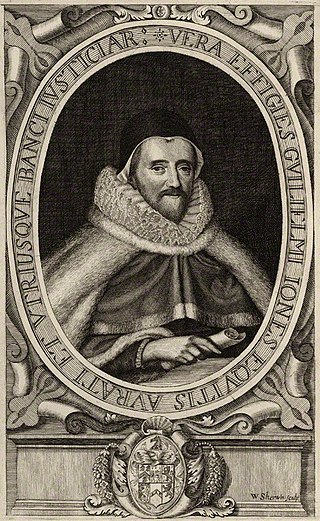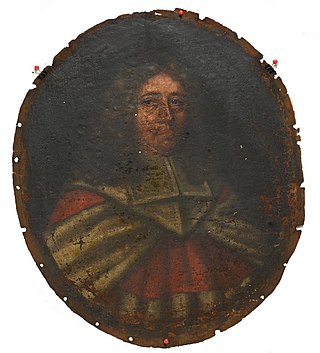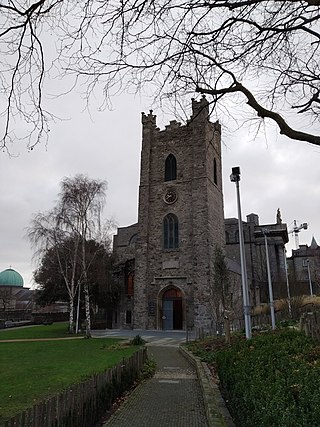Career
He was born in Suffolk. [2] He studied law at Thavie's Inn, and then Lincoln's Inn. He was called to the Bar in 1594. [2] He appears to have lived in Ireland for some years in the 1590s. Joan Sparke, who died in 1596, and was the wife of Stephen Sedgrave of Dublin, was clearly a close relative, possibly a sister, of William. There is a memorial to Joan and Stephen in St. Audoen's Church, adjoining William's own. [3]
He was sent back to Ireland as a justice of the Court of King's Bench (Ireland) in 1610. [4] He was an extra justice, [5] appointed to help clear the large backlog of work which had built up (King's Bench was normally the busiest of the Irish Royal Courts), and in the hope that, unlike some of his colleagues, he would be willing to go on assize [5] (in the event he proved a diligent assize judge, and won praise for his erudition and good service to the Crown). [2] He was quickly made fourth justice of the King's Bench, [5] with an assurance of becoming second justice in due course. [2] A fresh patent of appointment was issued to him in 1615, presumably to confirm his status as a permanent judge. [4]
He attended several sessions of the Parliament of Ireland of 1613–15, to act as legal adviser to the Irish House of Lords, as was customary for High Court judges at the time (Sir John Elliott, Baron of the Exchequer, attended these sessions in the same capacity). [2]
He was knighted by the Lord Deputy of Ireland in 1619, and granted a coat of arms. [2] He joined the King's Inns and was its Treasurer in 1620–21. [6] He died in 1623, and was remembered as a learned and upright judge. [2]
The Sparke Memorial
He married firstly Elizabeth Hales, [2] and secondly Mary Bryce or Brice, daughter of John Bryce, Mayor of Dublin 1605–6, and widow of John Hoey, Sergeant-at-arms in Ireland, and of Roger Downton. [1]
It was Mary who erected the memorial to William, which can still be seen in the North Nave of St Audoen's Church, Cornmarket, Dublin. [1] The memorial features a pediment and Corinthian columns; Mary is shown kneeling beside William. Other figures on the memorial represent Mary's first husband John Hoey and her parents, John Bryce and Katherine Sedgrave. A memorial to Joan Sparke, who was probably William's sister, and her husband Stephen Sedgrave stands side by side with Sparke Memorial. [1]

Sir William Jones (1566–1640) was a Welsh judge, and a Member of Parliament (MP) for the Welsh Borough of Beaumaris.

William Caulfield was an Irish barrister, Law Officer and judge: one of his sons became Lord Chief Justice of Ireland.
William Scott was an Irish lawyer and judge.
Sir Bernard Hale (1677–1729) was an English-born barrister and judge who became Chief Baron of the Irish Exchequer. Two of his sons became Generals in the British Army.
Sir John Denham (1559–1639) was an English-born judge who spent part of his career in Ireland. He is chiefly remembered now as one of the "Ship-money judges" who decided the so-called Ship Money case, Rex v. Hampden. He was the father of the poet Sir John Denham.
Sir William Ryves (1570–1647) was a barrister and judge, and a member of a distinguished Dorsetshire family. He enjoyed a successful legal career in Ireland, holding office as Attorney-General for Ireland and as a justice of the Court of King's Bench (Ireland). For a time he acted as Deputy to the Lord Chancellor of Ireland.

Sir Richard Reynell, 1st Baronet, was an English-born judge who had a distinguished career in Ireland and held office as Lord Chief Justice of the King's Bench in Ireland. He was the first of the Reynell baronets of Laleham.
Sir William Davys was an Irish barrister and judge who held the offices of Recorder of Dublin, Prime Serjeant and Lord Chief Justice of Ireland. He was suspected of Roman Catholic sympathies and was threatened with removal from the bench as a result, but he succeeded in retaining office until his death, due largely to his influential family connections.
Sir George Shurley (1569–1647) was an English-born judge who held the office of Lord Chief Justice of Ireland. Uniquely among the holders of that office, he ranked as junior in precedence the to Chief Justice of the Irish Common Pleas.
The chief justice of Munster was the senior of the two judges who assisted the Lord President of Munster in judicial matters. Despite his title of Chief Justice, full judicial authority was vested in the lord president, who had "power to hear and determine at his discretion all manner of complaints in any part of the province of Munster", and also had powers to hold commissions of oyer and terminer and gaol delivery.
William Skrene was an Irish-born barrister and judge who spent most of his adult life in England, where he became King's Serjeant and a judge of assize. He also served briefly as Chief Baron of the Irish Exchequer in 1395-7. He acquired substantial lands in Essex.
Thomas Stockton (1609–1674) was an English-born judge who held office in seventeenth-century Ireland.

Sir William Bathe was an Irish judge and landowner. He is commemorated by the Dowdall Cross in Duleek, County Meath, which was erected by his widow Janet Dowdall in 1601. He should not be confused with his much younger cousin William Bathe of Drumcondra Castle, who was a Jesuit and noted musicologist.
Sir John Lyndon was an Irish judge and politician of the seventeenth century. He was the first holder of the office of Third Serjeant-at-law, which was created especially for him, apparently as a "consolation prize" for not being made a High Court judge the first time he sought that office.

Sir John Bere, whose surname was also spelt Beere or Bare, was an Irish politician, Crown official, barrister and part-time judge of the early seventeenth century. He held office as King's Serjeant, and sat in the Irish House of Commons in the Parliament of 1613–15.
Walter FitzWilliam Cotterell was an Irish barrister and Crown official of the late fourteenth century. He was Serjeant-at-law (Ireland) and acted from time to time as a judge of gaol delivery and of assize, although he was never a justice in the Royal Courts. The evidence suggests that he was a conscientious and hard-working official who enjoyed the complete trust of the English Crown.
Sir John Elliott (1546-1617) was an Irish judge of the late sixteenth and early seventeenth centuries, who held office as third Baron of the Court of Exchequer (Ireland). He was also occasionally employed on diplomatic missions. Though his highly successful career was due largely to his own merits, it probably also owed something to his useful family connections, notably with the Rochfort family and the Usshers.

Peter Palmer was an English-born judge who served in Ireland for many years, into extreme old age.
This page is based on this
Wikipedia article Text is available under the
CC BY-SA 4.0 license; additional terms may apply.
Images, videos and audio are available under their respective licenses.







